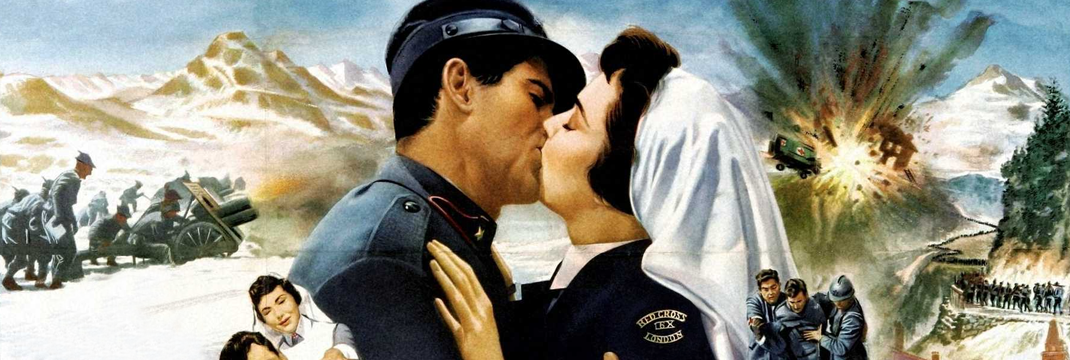
Ernest Hemingway himself was perceived as a macho and an extremely virile person who looked in a very masculine way, sporting beard and being muscular and sturdy built, and was a womanizer. Therefore, his oeuvre is often viewed primarily as proclaiming masculine values, such as authority, courage, decisiveness, duty, and others, and featuring submissive and fragile women. Whereas it can relate to some of Hemingway’s works, this thesis is refuted in his early novel A Farewell to Arms(1929). In the novel, Hemingway features non-traditional masculinity by allowing the protagonist to take a position of submission to his beloved woman, but it is done implicitly so that the protagonist is not perceived as weak or feminine.
On first sight, Hemingway’s A Farewell to Arms may seem like a completely masculine topic as one of its primary subjects is war. Indeed, the author continues “his cult of masculine violence” by vividly depicting battle scenes and inflicting wounds on the protagonist (Fantina 64). As a rule, the traditional masculinity associated with violence and pain, and Hemingway picks up this tradition. The majority of authors felt the world hostile after the Great War, and Hemingway was not an exception. In his many works, the author portrays war, wounded heroes, pain, and death. However, in this aspect, power and physical prowess are working along with surrender. While a hero inflicts wounds on his enemies, he is hurt in return and therefore, has to surrender. Thus, masculinity is exercised and surrenders simultaneously.
In A Farewell to Arms, Hemingway portrays different sides of masculinity. Frederic Henry goes to the war, which is a manly deed requiring duty and courage. However, there Frederic is not engaged in actual battles; he works as a driver. During World War I, Frederic Henry gets wounded and has to suffer his wounds manlily; only it happens not gloriously in action but during his mealtime when he gets hurt by a shell explosion. Furthermore, Frederic deserts the army, which is deemed to be unmanly and cowardly, but he does it to avoid a ‘stupid death’ after having seen that the Italian police shoot officers for retreating. Thus, the act of the chicken-hearted desertion can be viewed as a wise action to protect himself against the stupidity of war. In this way, Hemingway is able to show masculinity not as something linear that has a certain set of unchangeable characteristics but as a fluid form that changes under the circumstances. Furthermore, Charles Hatten explains, “[I]n World War I, the masculine experience of war was itself so transformed by technology as to overwhelm notions of war as a site of individual masculine achievement” (81). Observing it firsthand, Frederic realizes that his courage and masculinity are not valid against the power of heavy weaponry, and thus, there is little sense exercising it.
Invite your friends and get bonus from each order they
have made!
Hemingway’s A Farewell to Arms
The protagonist does not exercise his masculinity through participation in action, but he suffers his wounds gracefully. Richard Fantina sums up Hemingway’s philosophy, “The avoidance of necessary pain represents cowardice. The acceptance of necessary pain represents courage” (69). The topic of masculinity in pain is continued by the critic Debra A. Moddlemog who states, “[T]he wound marks a character’s inner worth, especially his virility” (182). Even though Frederic is not wounded on the battlefield, he suffers his pain stoically. However, at this point, Frederic Henry is not fully aware of what war truly is, and he is eager to return back to the war. His masculinity is threatened to stay away from the action. John Draughon explains, “War gave him the rules he must play by, and now that he is wounded, he would be discarded, no longer able to live up to his duty as a man” (12).
Another side of Frederic’s masculinity is showed in his relationship with Catherine Barkley. While many critics assert that Catherine is a submissive woman who gives her life for Frederic and is merging with him, her actions reveal that often she is in charge in their relationship (Fantina 115). It begins from their first kiss initiated by Frederic. Catherine reacts with a slap in the face, but later she kisses him (Hemingway 30). Also, she is first to start the game ‘in love’ when she asks Frederic to say that he loves her and later frankly announces it a game (Hemingway 31). In this way, Catherine takes the lead and guides Frederic through their relationship. However, her words and actions make her look like a typical submissive woman who has no will of her own. She says, “I want what you want. There isn’t any me anymore” (Hemingway 181). While it may look like an act of utter dependence, it is, in fact, an attempt to possess the lover’s body and soul. Richard Fantina explains, “Remarks such as this disguise the fact that it is Frederic who surrenders himself to Catherine, after initially trying to resist falling in love with her” (115).
Frederic’s soft side is shown further when his relationship with Catherine is developing. Gradually, Frederic Henry comes from playfully professing his love to Catherine to actually loving her. Although he expected to get a one-night stand, Frederic finds himself in this relationship and gives himself completely to it. Moreover, he gives a poetic description of Catherine’s hair saying, “it would all come down and she would drop her head and we would both be inside of it, and it was the feeling of inside a tent or behind a falls” (Hemingway 126). In this way, Frederic reveals his vulnerability and a different side to his masculinity. This is the masculinity that is able to be tender and submissive at times. Even his injury throws light to an implicit reversal of traditional masculinity. In his book, Ernest Hemingway Machismo and Masochism, Richard Fantina quotes Mark Spilka who explains that Hemingway implied that Frederic’s leg injury made him unable to perform lovemaking in a traditional way, male on top (108). While Hemingway could not refer to it directly not only due to censorship but also because of the existing, still very prudish mores, he simply implied it (Spilka qtd in Fantina 108). Additionally, Catherine’s domineering position in the relationship with Frederic can be seen in her cropped hair. Hemingway often portrayed strong women with short hair (Fantina 110).
Struggling with your essay?
Ask professionals to help you!
Start Chat
New criticism favors Hemingway’s new interpretation of masculinity as more natural and less contrite. Fantina stresses that nowadays Hemingway is valued for “distinctly nonaggressive and relatively selfless expression of male sexuality” (7). In the twentieth century, many things and many notions changed. The wars affected people irrevocably and the old ideal of masculinity, of a domineering male who responds to the call of duty, no longer valid. At least, a male needs to adapt to the circumstances and sometimes reveal his tender side. Taking everything into account, in A Farewell to Arms, Ernest Hemingway reflected how a young man enters the war full of lofty ideas about courage, honor, and duty and leaves it truly mature, but his maturity occurs under the strain of losses and deaths rather than acting according to empty words.



